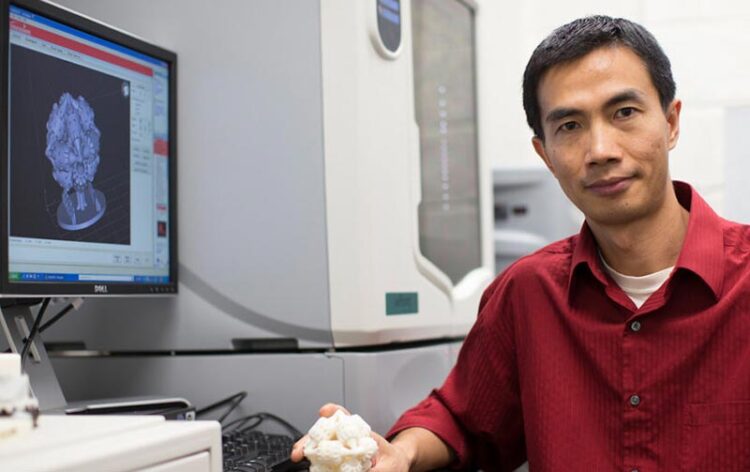Transportation Planning Goes Viral

Xueping Li
Photo: UTK
Freight transportation is a backbone of the US economy — and a significant contributor to US greenhouse gas emissions. In fact, freight accounts for nearly 10% of annual U.S. emissions,ISE Dan Doulet Faculty Fellow and Professor Xueping Li points out. Li and an interdisciplinary, multi-institutional team have been awarded funding from the US Department of Energy to launch a first-of-its-kind, national-scale undertaking to address freight’s impact on climate change — and climate change’s impact on this vital sector.
Funding from DOE’s Advanced Research Projects Agency-Energy (ARPA-E) is highly competitive. “Any company, national lab, or university in the country could apply. Only six projects were chosen this year,” Li says. “It’s so exciting to be one of the teams.” As principal investigator, Li is working alongside Assistant Profeessor Hugh Medal and Professor Kevin Heaslip from the Tickle College of Engineering, UT graduate students, faculty from West Virginia University, and researchers from Oak Ridge National Laboratory.
“We want to help reduce freight’s greenhouse gas emissions and help make it more resilient to climate-related challenges and acute disruptions,” Li says. To accomplish this two-part mission, the team is developing a cognitive digital twin for the entire US intermodal transportation network, including roads, rails, and waterways.
“A digital twin,” Li explains, “is a virtual representation of a physical system, like a motor or factory. With it, you conduct what-if analyses and determine how to optimize system performance.” Digital twins are becoming mainstream in some industries; this team is leapfrogging to the next iteration.
“With a cognitive digital twin,” Li says, “you ask your what-ifs, see the impacts in the model, make changes in the physical world … and sensors, cameras, and other technologies feed the evolving real-world data back into the twin. You monitor the system operations, and the twin learns from new data and continues evolving.”
State transportation agencies, city planners, shipping companies, and supply chain professionals use an array of methods and models for flow planning, scheduling, and optimizing for cost efficiency. But, Li says, “There’s a decent chance many people still use spreadsheets or even do the work by hand.” This limits the scale, scope, and speed of transportation planning.
The team’s cognitive digital twin will remove those limitations and enable decision-makers to understand both the tradeoffs and the synergies between competing priorities. “We want users to see all their options and how to best prioritize for time, cost and emissions,” Li says. “They could see that a route planned for trucking could use rail more quickly and with fewer emissions. Or they could find a more fuel-efficient route for the truck, which also costs less. Since this will cover the nationwide system, they’ll see how optimizing for one location or mode of transport affects the big picture.”
The twin will also serve users facing more frequent extreme weather events. “If you need to ship goods from Miami to Boston, but a hurricane is coming up the coast, or it already left behind damaged infrastructure,” Li asks, “what can you do?” The cognitive digital twin will quickly, effectively enable rerouting — and increased resilience.
As the twin takes shape, the team will submit a technology-to-market plan to ARPA-E. “To make an impact,” Li says, “we will translate and transform our research into working prototypes available to industry partners and government agencies.” With that end in mind, the team is forming an advisory board with industry partners to guide the research and development of the twin.
The University of Tennessee invests in research areas that address complex, urgent real-world challenges. Future mobility of people and goods is one such priority area. By earning ARPA-E funding, Li’s team will continue advancing the university’s solutions-oriented leadership in decarbonizing transportation and strengthening the systems that keep the economy running.
Media Contact
David Goddard
University of Tennessee at Knoxville
david.goddard@utk.edu
Office: 865-974-8304
All latest news from the category: Transportation and Logistics
This field deals with all spatial and time-related activities involved in bridging the gap between goods and people, including their restructuring. This begins with the supplier and follows each stage of the operational value chain to product delivery and concludes with product disposal and recycling.
innovations-report provides informative reports and articles on such topics as traffic telematics, toll collection, traffic management systems, route planning, high-speed rail (Transrapid), traffic infrastructures, air safety, transport technologies, transport logistics, production logistics and mobility.
Newest articles
Faster, more energy-efficient way to manufacture an industrially important chemical
Zirconium combined with silicon nitride enhances the conversion of propane — present in natural gas — needed to create in-demand plastic, polypropylene. Polypropylene is a common type of plastic found…

Energy planning in Ghana as a role model for the world
Improving the resilience of energy systems in the Global South. What criteria should we use to better plan for resilient energy systems? How do socio-economic, technical and climate change related…

Artificial blood vessels could improve heart bypass outcomes
Artificial blood vessels could improve heart bypass outcomes. 3D-printed blood vessels, which closely mimic the properties of human veins, could transform the treatment of cardiovascular diseases. Strong, flexible, gel-like tubes…





















